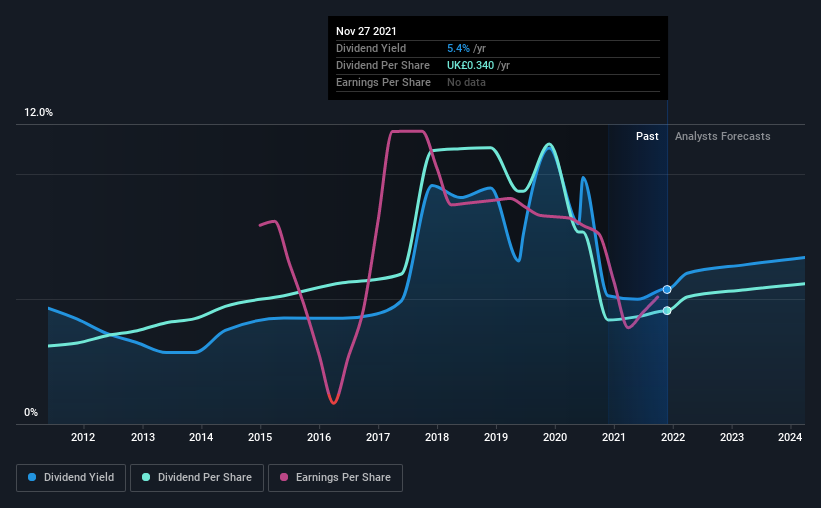PayPoint's (LON:PAY) Upcoming Dividend Will Be Larger Than Last Year's
PayPoint plc (LON:PAY) will increase its dividend on the 30th of December to UK£0.085. This will take the annual payment to 5.2% of the stock price, which is above what most companies in the industry pay.
See our latest analysis for PayPoint
PayPoint's Payment Has Solid Earnings Coverage
We like to see robust dividend yields, but that doesn't matter if the payment isn't sustainable. Prior to this announcement, the company was paying out 104% of what it was earning and 95% of cash flows. This indicates that the company could be more focused on returning cash to shareholders than reinvesting to grow the business.
The next year is set to see EPS grow by 53.7%. If the dividend continues along recent trends, we estimate the payout ratio will be 64%, which would make us comfortable with the sustainability of the dividend, despite the levels currently being quite high.
Dividend Volatility
While the company has been paying a dividend for a long time, it has cut the dividend at least once in the last 10 years. Since 2011, the dividend has gone from UK£0.23 to UK£0.34. This works out to be a compound annual growth rate (CAGR) of approximately 3.8% a year over that time. Modest growth in the dividend is good to see, but we think this is offset by historical cuts to the payments. It is hard to live on a dividend income if the company's earnings are not consistent.
PayPoint May Find It Hard To Grow The Dividend
Growing earnings per share could be a mitigating factor when considering the past fluctuations in the dividend. Earnings has been rising at 3.1% per annum over the last five years, which admittedly is a bit slow. The earnings growth is anaemic, and the company is paying out 104% of its profit. Limited recent earnings growth and a high payout ratio makes it hard for us to envision strong future dividend growth, unless the company should have substantial pricing power or some form of competitive advantage.
PayPoint's Dividend Doesn't Look Sustainable
Overall, we always like to see the dividend being raised, but we don't think PayPoint will make a great income stock. The track record isn't great, and the payments are a bit high to be considered sustainable. Overall, we don't think this company has the makings of a good income stock.
It's important to note that companies having a consistent dividend policy will generate greater investor confidence than those having an erratic one. At the same time, there are other factors our readers should be conscious of before pouring capital into a stock. Taking the debate a bit further, we've identified 3 warning signs for PayPoint that investors need to be conscious of moving forward. If you are a dividend investor, you might also want to look at our curated list of high performing dividend stock.
This article by Simply Wall St is general in nature. We provide commentary based on historical data and analyst forecasts only using an unbiased methodology and our articles are not intended to be financial advice. It does not constitute a recommendation to buy or sell any stock, and does not take account of your objectives, or your financial situation. We aim to bring you long-term focused analysis driven by fundamental data. Note that our analysis may not factor in the latest price-sensitive company announcements or qualitative material. Simply Wall St has no position in any stocks mentioned.
Have feedback on this article? Concerned about the content? Get in touch with us directly. Alternatively, email editorial-team (at) simplywallst.com.

 Yahoo Finance
Yahoo Finance 
